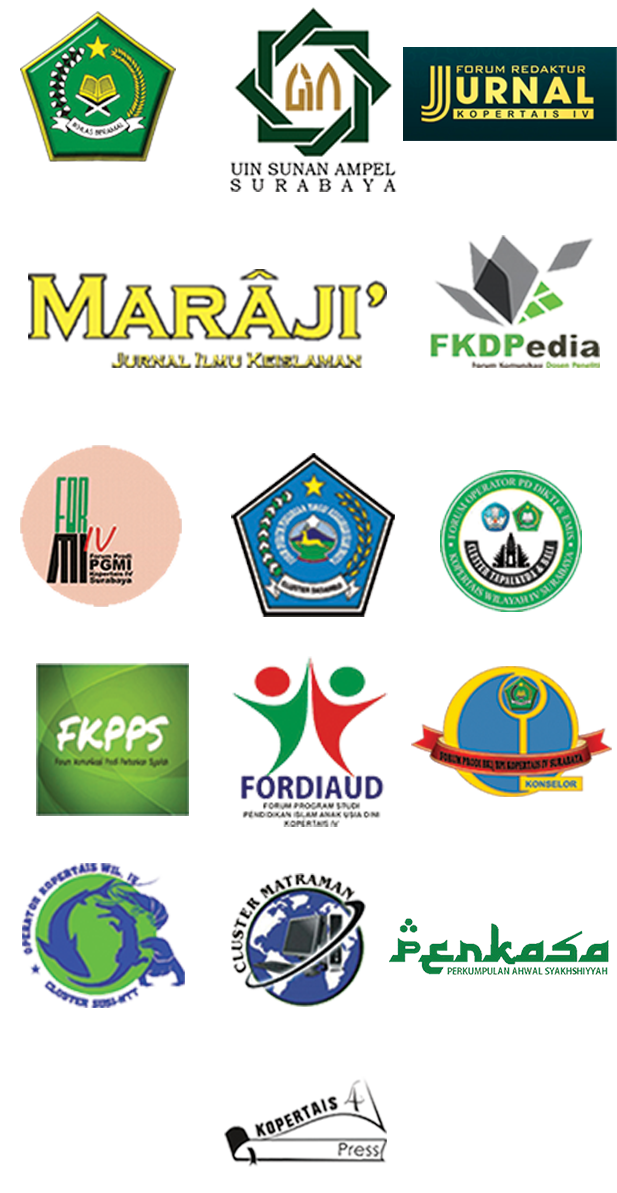Knowledge Management as an Alternative for Developing Arabic Teaching Based on Religious Moderation: Implications for Islamic Boarding Schools in Madura
Abstract
This was motivated by the launch of the religious moderation policy by the Minister of Religion Gus Yaqut Cholil Qoumas, as well as the implementation of the independent curriculum policy, the Merdeka campus, and the driving school by Nadiem Makarim (Minister of Education and Culture). Indonesia is experiencing significant development and dynamics of change. According to online news, and reference research from Google Scholar, and Scientific Direct, data on Islamic boarding school learning and education is very high. However, on the other hand, 80% of the education in Islamic boarding schools or non-formal institutions has decreased. This study aims to increase religious moderation in Madura Islamic boarding schools, in learning Arabic, the yellow book, and ta'limu' mutaallim culture with a knowledge management approach. Naturalization in this research is based on a qualitative descriptive case study in a Madura Islamic boarding school. This means that researchers are dealing directly (directly) with the research location, with the methods of interview, observation, and documentation. The subjects of this study consisted of clerics, ustadz, policymakers (community leaders), and students. For this reason, that research is more objective, credible, and reliable. The data analysis technique used is based on Miles and Huberman's research theory. Namely data display, data reduction, data presentation, and data verification. The analytical knife is strengthened by triangulation techniques, namely researchers in processing and analyzing data until they are saturated (perfect). The results of this study describe the concept of religious moderation that needs to be introduced and conveyed to the Madurese community, especially the santri. With a knowledge management approach (knowledge management), namely implementing mufradat and fasohah literature related to religious moderation. Among them, students are given insight, counseling guidance, and spiritual moderation (wasatiyah). The Ustadz are at the facility by participating in comparative studies, workshops, strengthening education quality management, and training in Arabic learning. on the one hand, so that students can accept religious tolerance and moderation. Because basically in Madura it is very close and closely related to problems of understanding, for example between NU and Muhammadiyah, therefore one alternative is language Arabic learning based on religious moderation which is strengthened by knowledge management in the world of Islamic boarding schools.
Downloads
References
Arikunto, Suharsimi. Metodologi Penelitian Pendidikan: Teknik Pengumpulan Data Model Moleong. Bumi Aksara, 2013.
Aripudin, Acep, Mohammad T. Rahman, Dede Burhanudin, Sumarsih Anwar, Ibnu Salman, and Masmedia Pinem. “The Spiritual Experience of Chinese Muslim Minorities Post-1998 Reformation: A Study of Chinese Muslims Becoming Indonesians.” HTS Teologiese Studies / Theological Studies 78, no. 4 (2022): 1–8. https://doi.org/10.4102/hts.v78i4.7648.
Echols, John M., and Hassan Shadily. An Eglish-Indonesia Dictionary. Jakarta: Gramedia Pustaka Utama, 2008.
Fahmi, Muhammad, Irwan Abdullah, Hasanah Hasanah, Imam Mujahid, and Misbah Zulfa Elizabeth. “Media Representations of Gender: The Marginalization of Female Muslim Scholars in Indonesia.” Journal of Critical Reviews 7, no. 5 (n.d.): 250–55.
Fathurrosyid. “Nalar Moderasi Tafsir Gus Baha’; Studi Kontestasi Pengajian Tafsir Al-Qur’an Di Youtube.” SUHUF: Jurnal Pengkajian Al-Qur’an Dan Budaya 13, no. 1 (2020): 77–101. https://jurnalsuhuf.online/suhuf/article/view/528/206.
Huda, Syamsul, Devy Habibi Muhammad, and Ari Susandi. “Konsep Pendidikan Islam Multikultural Dalam Pandangan KH. Abdurrahman Wahid Dan Nurcholis Majid.” Jurnal Pendidikan Dan Konseling 4, no. 2 (2022): 148–56. https://jpdk.org/index.php/jpdk/article/view/250/195.
Ichsan, Ahmad, and Yafi Hutagalung. “Manajemen Anak Didik Growing PAUD Inklusi Yogyakarta.” Proceedings of The 4th Annual Conference on Islamic Early Childhood Education 4, no. 1 (2019): 327–36.
Inayatillah, Kamaruddin, and M. Anzaikhan. “The History of Moderate Islam in Indonesia and Its Influence on the Content of National Education.” Journal of Al-Tamaddun 17, no. 2 (2022): 213–26. https://doi.org/10.22452/JAT.vol17no2.17.
Jailani, Mohammad, and Suyadi. “Muhammadiyah Covid-19 Islamic Boarding School: A Complete Self-Isolation Model With Neurospiritual and Psychosocial Approaches.” Islam Realitas: Journal of Islamic and Social Studies 7, no. 2 (2021): 25–33. https://doi.org/http://dx.doi.org/10.30983/islam_reality.v7i2.4817.
———. “The Impact of Neuroscience-Based Modern Islalamic Educatioan on the Aspect of Creative Imagination and Development of Religious Moderation on Madura Island.” Islam Transformatif 6, no. 2 (2022): 157–72. https://doi.org/http://dx.doi.org/dx.doi.org/10.30983/it.v6i2.5793.
Jailani, Mohammad, Suyadi, and Betty Mauli Rosa Bustam. “The First HISPISI ’ s International Conference on Humanities , Education , Law , and Social Sciences ‘ New Findings during Pandemic in Social Science , Humanities , Education and Law .’” In Neuroscience Based Islamic Learning a Critique of the Holistic Education Crisis in Pamekasan Madura, edited by Professor James A. Banks, Professor Ian Davies, Professor Ying Huei Chen, Professor Zakiyuddin Baidhawy, Associate Professor Bulent Tarman, and Associate Professor Dr. Zulhamri Abdullah, 123–34. Jakarta: Universitas Negeri Jakarta, 2021.
Jailani, Mohammad, and Suyadi Suyadi. “The Contribution of Ibnu Sina Multilevel Intellect and Neuroscience: In Learning Al-Qur’an Hadith in Vocational High Schools in the Covid-19 Era.” DAYAH: Journal of Islamic Education 6, no. 1 (2023): 1. https://doi.org/10.22373/jie.v6i1.13435.
Kosasih, Engkos, Agus Suyadi Raharusun, Reza Pahlevi Dalimunthe, and Aceng Abdul Kodir. “Literasi Media Sosial Dalam Pemasyarakatan Moderasi Beragama Dalam Situasi Pandemi Covid-19.” Digital Library UIN Sunan Gunung Djati Bandung, 2020.
Malik, Muhammad Khoirul. “Potret Kekhalifahan Islam Dinamika Kepemimpinan Islam Pasca Al-Khulafa Al-Rasyidun Hingga Turki Utsmani.” Tsaqafah Jurnal Peradaban Islam 13, no. 46 (2017): 135–56. https://doi.org/http://dx.doi.org/10.21111/tsaqafah.v13i1.980 Potret.
Mohammad Jailani, Naufal Hafidh, and Miftachul Huda. “The Influence of Upin and Ipin Animation on Children’S Religious Life.” Penamas 36, no. 1 (2023): 82–103. https://doi.org/10.31330/penamas.v36i1.650.
Mufti, Umam, Hafidh Nur Fauzi, and Djamaludin Perawironegoro. “Implementasi Manajemen Pengetahuan Islam Di Sekolah Muhammadiyah.” Jurnal Tarbiyatuna 10, no. 2 (2019): 181–87. https://doi.org/10.31603/tarbiyatuna.v10i2.2724.
Nasrowi, Bagas Mukti. “PEMIKIRAN PENDIDIKAN ISLAM K.H. ABDURRAHMAN WAHID TENTANG MODERASI ISLAM.” Edukasia Jurnal Pendidikan Dan Pembelajaran 1, no. 1 (2020): 71–84.
Niki Alma Fauzi. “Nalar Fikih Baru Muhammadiyah: Membangun Paradigma Hukum Islam Yang Holistik.” Afkaruna 15, no. 1 (2019): 19–42. https://doi.org/10.18196/%0AAIIJIS.2019.0093.19-41.
RI, Kementerian Agama. Moderasi Beragama. Jakarta: Badan Litbang dan Diklat Kementerian Agama RI, 2019.
Sugiyono. Metode Penelitian Kuantitatif Kualitatif Dan R&D. 1st ed. Bandung: Alfabeta, 2017.
Suhid, Asmawati BTE T E, R. Warren, WilbertJ. McKEACHiE, Dasar Pendidikan, Penyata Razak, Ordinan Pelajaran, Laporan Rahman Talib, et al. “Malaysian Teacher Quality for Human Capital Development.” Australian Journal of Teacher Education, 2010.
Tang, M, M Muslimah, A Riadi, and ... “Student Attitudes: A Comparative Analysis Of Burhanuddin Al-Zarnuji’s Thought And The Islamic Education Perspectives.” At-Tarbiyat: Jurnal … 4, no. 1 (2021): 1–13. http://jurnal.staiannawawi.com/index.php/At-Tarbiyat/article/view/244.
Ushuluddin, Achmad, Abd Madjid, Siswanto Masruri, and Mohammad Affan. “Shifting Paradigm: From Intellectual Quotient, Emotional Quotient, and Spiritual Quotient toward Ruhani Quotient in Ruhiology Perspectives.” Indonesian Journal of Islam and Muslim Societies 11, no. 1 (2021): 139–62. https://doi.org/10.18326/IJIMS.V11I1.139-162.
Wijaya, Muhamad Rudi, Darul Ulum, Lampung Timur, Article Info, and K H Abdurahman Wahid. “Dakwah Pluralisme K . H Abdurrahman Wahid ( Gus Dur ) Di Indonesia : Suatu Konsep Pandangan.” Journal of Community Development (JCD) 01, no. 01 (2022): 34–41.
Zamhari, Arif. “Defending Islamic Tradition Theological Responses of the Hadrami Majlis Taklim Groups toward the Salafi-Wahabi Preaching Movement in Contemporary Indonesia.” Journal of Indonesian Islam 16, no. 1 (2022): 75–102. https://doi.org/10.15642/JIIS.2022.16.1.75-102.
Copyright (c) 2024 Mohammad Jailani

This work is licensed under a Creative Commons Attribution-ShareAlike 4.0 International License.









